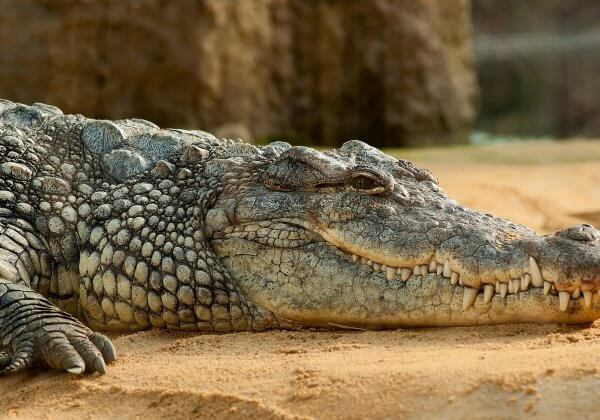PETA ‘Crocodiles’ Troll Hermès Stores on Australian Tour
Trios of “crocodiles” are protesting outside Hermès stores around Australia as the company continues with plans to build the country’s biggest crocodile farm.
Wearing crocodile masks and green bikinis, activists holding bag-shaped signs – which implored the company to “bin crocodile skin” and reminded shoppers that “animals die for exotic skins” – demonstrated outside the Hermès store in Sydney in their first of three appearances across the country.
Why three? That’s how many crocodiles it takes to make just one Hermès handbag.
 Etienne Ortovent
Etienne Ortovent
Protests will also be held outside Hermès stores in Melbourne and Brisbane in the coming weeks.
SEE PHOTOS FROM THE PROTEST IN MELBOURNE CHECK OUT THE VIDEO FROM BRISBANE'S PROTEST
Cruelty to Crocodiles
There’s nothing stylish about cramming sensitive animals into pits, hacking them apart, and leaving them to die – yet fashion companies like Hermès continue to expand crocodile-farming operations in Australia.
The latest proposed development would imprison up to 50,000 saltwater crocodiles in the Northern Territory. The facility would include an egg incubation laboratory, a hatchery, grower pens, finishing pens, an open farm area, refrigerated feed preparation area, and storage areas.
Every PETA exposé of the exotic-skins industry has shown that no matter the source – or the “standards” touted by brands – products made from skins involve forcing highly intelligent, sensitive animals to endure imprisonment in squalid conditions and a violent death.
From the moment they hatch, farmed crocodiles are denied everything that’s natural and important to them – confined to small concrete pens and unable to swim free. When they’re killed, their snouts are bound and they’re electrocuted or shot and then stabbed in the neck to sever their spinal cords.



Exotic Skins and Zoonotic Diseases
Because crocodiles who are raised on farms for their skin are kept crowded together in highly unhygienic conditions – one on top of the other in pits of putrid water – conservation experts are warning that the next pandemic could come from the fashion industry.
Much like a “wet market”, where COVID-19 originated, crocodile farms create a breeding ground for many zoonotic pathogens, including salmonella, vibrio, Aeromonas spp, Pseudomonas spp, E coli, trichinella, and West Nile virus – all of which crocodilians have been found to carry and can pass on to humans.
 Etienne Ortovent
Etienne Ortovent
The good news is that exotic skins are falling out of favour with designers and consumers alike. Already, luxury brands like Tommy Hilfiger, Chanel, HUGO BOSS, Victoria Beckham, Vivienne Westwood, and others have ditched crocodile and other skins.
Now is the time to invest in humane, sustainable, and future-proof projects, not build new factory farms to torment animals and create a breeding ground for new pandemics. Join us in urging Hermès to shed exotic skins now:







